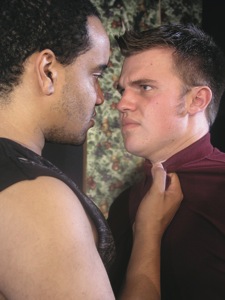Theater
Of tyranny, mavericks and those backwater blues
Published Thursday, 13-Nov-2008 in issue 1090
‘Prometheus Bound’ and ‘Cyclops’
Bucking the establishment can be a costly proposition, especially if you tick off the head god.
Aeschylus tells of the Titan Prometheus, the quintessential rebel, who crossed Zeus by befriending the very mortals Zeus had marked for extinction. Not only that, he gave them useful knowledge such as mathematics and medicine, and – most offensive of all – stole fire and gave it to man.
For these transgressions, Prometheus (Brian Abraham) is dragged up to a high rock by Hephaestus (Bianca Chapman), where he will be chained and left for eternity (or until Zeus is brought down), with neither protection nor mortals for company, and where an eagle will peck at his eyes and entrails.
The Theatre, Inc. presents Dr. Marianne McDonald’s accessible translations of two Greek one-acts – Aeschylus’ Prometheus Bound and Euripides’ satyr play Cyclops – through Sunday, Dec. 14 at The Theatre’s newly renovated digs. Douglas Lay directs both.
Of course, as both messenger Hermes (Rhys Green) and the visiting Oceanids (Melissa Hamilton, Vanessa B. Milton and Diana Sparta) remind him, Prometheus could always reconcile with Zeus and avoid this terrible torture. But this is a contest of wills: Zeus uses power and force; Prometheus prefers knowledge and compassion. Prometheus also holds the winning card of foresight: he knows how Zeus will eventually be brought down.
The capriciousness of the gods is further demonstrated by fellow victim Io (also played by Chapman), turned into a cow and afflicted by gadflies by Hera for acceding to Zeus’ sexual demands when he took a fancy to her.
Prometheus Bound is a static play in that the title character has to stand in crucifixion position for the better part of an hour. He also has most of the lines. Abraham rises to the challenge brilliantly, showing anger, indignation, agony and resignation with just face and voice.
Lay’s choice to give the Oceanids group movements (sometimes resembling yoga moves), presumably to give the audience something to look at, is only partially successful. And the use of umbrellas seems just odd.
Prometheus Bound presents several major tragic themes: tyranny, honor, victimhood and betrayal, to name a few. Some scholars question the authorship of the play (suggesting it may have been written by Aeschylus’ son), but no one disputes the power of its themes or the quality of its poetry.
In Cyclops the ancient Greeks used satyr plays at Athenian drama festivals as a sort of dessert – some light silliness after a trilogy of tragedies. Aeschylus is said to have been loved for his satyr plays, but none have survived.
Euripides’ Cyclops, the only surviving complete satyr play, makes fun of many things including heroism, power and man’s sexual appetites.
Cyclops gives us a trio of young satyrs (Greg Lawson, Devin O’Neill, Marcuz Rodriguez) and their dad Silenius (Rhys Green), who were shipwrecked on the rocks of Mt. Etna and taken captive by the one-eyed monster Cyclops (Brian Abraham). Satyrs, in case you’d forgotten, are often bald, usually bearded, and always sport a horse’s tail and a huge phallus.
Abraham gets to go from the world’s first rebel to one of the world’s most beloved monsters as the human-eating Cyclops, who gets some fine dining opportunities when Odysseus (Chris Fonseca) washes up on the rocks with his men.
The saving grace turns out to be the grape: get anybody drunk enough – even a monster – and you can best him.
Green is terrific as Silenius (and in his Prometheus Bound roles as well). Fonseca makes a fine Odysseus and Abraham finally gets a chance to move, even if he can’t see very well behind that mask. It’s a tour de force evening for him.
Lay plays this for laughs, and there are plenty of them, as these decidedly unheroic characters cavort around getting drunker and sillier, the younger satyrs finally ending up in a cheerleading routine. It’s a hoot, and a fine way to end the evening.
Prometheus Bound and Cyclops play in repertory with Euripides’ Helen through Sunday, Dec. 14, at The Theatre, Inc. Shows run Thursday through Saturday at 8 p.m.; Sunday at 2 p.m. For more information, visit www.gaylesbiantimes.com/links/1090.
‘George Orwell’s 1984’
Big Brother is back, along with doublespeak, telescreens and daily two-minute hate periods.
George Orwell’s 1984 – a dramatization of one of the most famous (and most frightening) dystopian novels of the 20th century – plays through Nov. 29 at OnStage Playhouse, directed by James M. McCullock. This excellent 1963 adaptation of Orwell’s 1949 novel was written by Robert Owens, Wilton E. Hall, Jr. and William A. Miles, Jr.
In a decaying London, 1984 describes Oceania, where life is regimented and controlled by Big Brother via an eavesdropping system of telescreens in each citizen’s flat. Everyone works a government-assigned job and individuality is not allowed.
Homogeneity of thought is maintained through the Ministry of Truth, where Winston Smith (Rob Conway) rewrites history to suit the Party because, as the Party slogan has it, “Who controls the past controls the future. Who controls the present controls the past.”
Winston’s colleague, the linguist Syme (Dan Feraldo), translates unruly language into Newspeak, with the aim of simplifying speech and narrowing the range of thought.
Winston is troubled by the more-than-coincidental appearance of the young and attractive Julia (Nicole Hagemeyer), who he fears may be a member of the Thought Police. But Winston, a Party maverick unable (and unwilling) to recognize that 2+2=5 if the Party wills it so, finds an ally (and even forbidden romance) in Julia, and for a while they maintain some semblance of normal life, egged on by Party member O’Brien (Bob Christiansen).
It will not last.
Orwell’s tale is riveting, especially for those who remember the Holocaust’s “final solution” and the days when the Soviet Union and the U.S. were locked in hearts-and-minds (and saber-rattling) struggles.
McCullock is to be commended for attempting this difficult play, and the stage crew should take a bow for their massive work on this piece, which requires multiple set changes.
Conway and Hagemeyer are attractive protagonists, though Conway’s portrayal of an affectless Winston in the first act works against both dramatic effect and the fact that Winston is presented as a renegade Party member.
Christiansen is terrific as the spy O’Brien who will preside over Winston’s torture and re-education. Feraldo is effective as Syme.
Though the title year is long gone, the famous party slogans (War is Peace. Ignorance is Strength. Freedom is Slavery) continue to give us chills. We need to remember.
George Orwell’s 1984 plays through Saturday, Nov. 29, at OnStage Playhouse. Shows Thursday through Saturday at 8 p.m.; matinee Sunday at 2 p.m. For more information, visit www.gaylesbiantimes.com/links/1090.
‘Backwater Blues’
Playwright/composer Michael Thomas Tower reaches back to his Texas roots in his new musical Backwater Blues, playing through Nov. 26 at Compass Theatre as part of the Q Plays series. Lindsey Duoos Gearhart directs.
This particular “backwater” is identified only as Toad Lake, which offers cultural events like the annual Milkweed Festival and sports a sheriff named Fetch (“as in ‘Rover, go?’” quips another character), played with a smart mouth and a nod to Fargo’s Marge by Grace Delaney.
Misplaced in Toad Lake is Arnie (Shaun Tuazon), young, gay and living in Sheriff Fetch’s garage. Seems he was born in a truck and immediately abandoned, and the sheriff took him in. Now grown up, Arnie feels the call of the bigger world outside and dreams of escape; when an all-male theater troupe is stranded in Toad Lake for an unspecified reason, Arnie sees his chance.
Problems with the show are legion. One is stereotypical characters, the most heavy-handed being Sheriff Fetch, with a drawl the size of Texas (somehow, curiously, Arnie escapes a drawl) and her mouth in a perpetual frown.
Along for the cookie-cutter ride are Joe (Trevor Bowles), who had a high school fling with Arnie but is now trying desperately to convince himself he’s straight; J. D. (Andy Collins), the self-loathing gay who can’t believe anyone could love him; Marvin (Tom Doyle), the queen who anchors the amusing production number “Dancing in a Tux” (his tux has hot pants, fishnet stockings and heels).
And let’s not forget Rock (Anthony Simone), who seems more like a hood than a performer, and whose unexplained theft of a bag of groceries sets up the rest of the farfetched plot.
There are a few good songs here – notably the aforementioned “Dancing in a Tux,” Rock’s ballad “I Used to Dream” and J. D.’s “How Could He Love Me?” But most of the songs might better be presented in dialogue, especially given this cast of inexpert singers (Doyle is a notable exception). Tuazon looks right as Arnie but his voice does not project, even in the small Compass hall.
Backwater is about finding yourself, following your dream and, of course, looking for Mr. Right. Tower has a facility with dialogue, but the constraints of the musical form and the predictability of the plot conspire to give the impression of a tired, almost preachy show.
Backwater Blues plays through Wednesday, Nov. 26, at Compass Theatre. Shows are Monday through Wednesday at 7:30 p.m.; Sunday at 7 p.m. For more information, visit www.gaylesbiantimes.com/links/1090.
|
|
Copyright © 2003-2025 Uptown Publications




